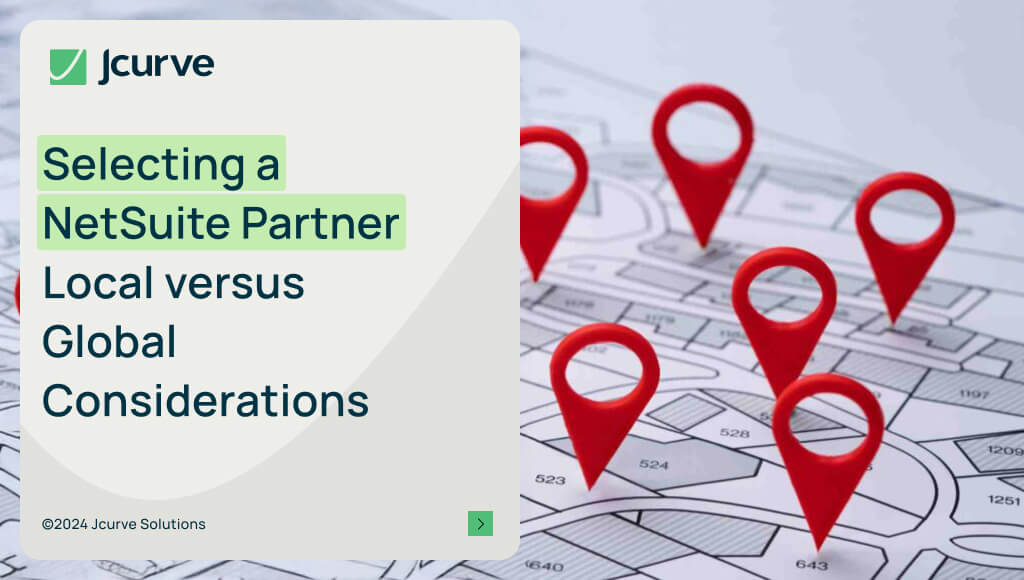
ในยุคดิจิทัลอย่างเช่นทุกวันนี้ การสื่อสารสามารถเข้าได้ถึงทุกมุมโลก ทำให้ผู้ซื้อมีโอกาสที่จะเลือกซื้อสินค้าได้ตามความพอใจ เมื่อธุรกิจเริ่มโตขึ้น องค์กรจะมีวิธีรับมือกับการบริหารจัดการระบบต่าง ๆ อย่างไร? คำตอบคือการเลือกพาร์ทเนอร์ NetSuite ดังนั้น ในบทความนี้ เราจะพาไปดูวิธีเลือกพาร์ทเนอร์ NetSuite อย่างไรให้ธุรกิจไปถึงเป้าหมายทั้งในระดับท้องถิ่นและระดับโลก
มุมมองระดับโลก
- สำรวจการทำงานในหลายประเทศกับพาร์ทเนอร์ระดับโลก
- รับประกันความสามารถในการขยายขนาดธุรกิจ
- ปรับใช้แนวทางปฏิบัติระดับโลกที่ดีที่สุด
มุมมองระดับท้องถิ่น
พาร์ทเนอร์ในระดับท้องถิ่น เช่น ระดับภูมิภาคหรือระดับประเทศ สามารถดึงข้อมูลเชิงลึกที่เป็นประโยชน์ต่อธุรกิจจากการใช้ ERP นอกจากนี้ พาร์ทเนอร์ในระดับท้องถิ่นยังมีความรู้เกี่ยวกับกฎระเบียบเฉพาะของพื้นที่นั้น ๆ เป็นอย่างดี ธุรกิจจึงสามารถดำเนินไปได้อย่างราบรื่น สอดคล้องกับข้อกำหนด และปราศจากปัญหาทางกฎหมาย
ไม่เพียงแค่นั้น แต่พาร์ทเนอร์ในระดับท้องถิ่นยังให้การสนับสนุนและฝึกอบรมได้อย่างสะดวกและรวดเร็ว โดยเฉพาะอย่างยิ่งในช่วงการเปิดตัวระบบครั้งแรก นอกจากนี้ ข้อดีของการสื่อสารด้วยภาษาท้องถิ่นก็คือการช่วยเพิ่มความคล่องตัวในการแก้ปัญหาและอำนวยความสะดวกในการฝึกอบรมต่าง ๆ ทำให้มั่นใจได้ว่าธุรกิจจะสามารถเพิ่มศักยภาพของระบบ ERP ได้อย่างสูงสุด
ข้อมูลเชิงลึกของตลาดท้องถิ่น
พาร์ทเนอร์ในระดับภูมิภาคจะมีข้อมูลเชิงลึกเกี่ยวกับตลาดท้องถิ่น การแข่งขัน และความต้องการของลูกค้า ซึ่งช่วยให้คุณสามารถปรับแต่งระบบ ERP ให้เหมาะกับการเปลี่ยนแปลงที่เกิดขึ้นในท้องถิ่นได้อย่างรวดเร็ว
รูปแบบพฤติกรรมผู้บริโภค
การทำความเข้าใจรูปแบบพฤติกรรมผู้บริโภคเป็นสิ่งสำคัญสำหรับธุรกิจในการสร้างสรรค์และพัฒนาผลิตภัณฑ์ บริการ รวมถึงการวางกลยุทธ์การตลาดอย่างมีประสิทธิภาพ ตัวอย่างเช่น หากภูมิภาคเห็นว่ายอดขายพุ่งสูงขึ้นในช่วงเทศกาลท้องถิ่น ระบบจัดการคำสั่งซื้อของ NetSuite ก็สามารถกำหนดค่าให้คาดการณ์และจัดการกับปริมาณคำสั่งซื้อที่เพิ่มขึ้นในช่วงเวลาเหล่านี้ได้
วิเคราะห์การแข่งขันทั้งทางตรงและทางอ้อม
โมดูลการจัดการทางการเงินของ NetSuite สามารถช่วยธุรกิจในการจัดทำงบประมาณ คาดการณ์ และวางแผนทางการเงิน ข้อมูลเชิงลึกเหล่านี้ได้มาจากมุมมองข้อมูลทางการเงินแบบองค์รวม ทำให้ธุรกิจสามารถวางตำแหน่งตนเองในการแข่งขันได้อย่างแม่นยำด้วยการสนับสนันการตัดสินใจโดยใช้ข้อมูลเชิงลึก
หนึ่งในฟีเจอร์ที่สำคัญ ได้แก่ Financial Consolidation ที่ช่วยให้ธุรกิจสามารถดูแลกระบวนการทางบัญชี ข้อมูล และการรายงานข้ามหน่วยงาน บริษัทสาขา และภูมิภาคต่าง ๆ ได้อย่างง่าย ๆ ด้วยการลดความซับซ้อนในการจัดการข้อมูลทางการเงินจากแหล่งต่าง ๆ และการรวมบัญชีให้เป็นระบบอัตโนมัติ ซึ่งไม่เพียงแต่ทำให้กระบวนการปิดบัญชีรวดเร็วขึ้นเท่านั้น แต่ยังรับประกันการปฏิบัติตามมาตรฐานการบัญชี ภาษี และข้อบังคับที่เกี่ยวข้อง โดยเฉพาะอย่างยิ่งในภูมิภาค เช่น ออสเตรเลียที่มีการเปลี่ยนแปลงเกิดขึ้นอยู่เสมอโมดูลการจัดการทางการเงินของ NetSuite สามารถช่วยธุรกิจในการจัดทำงบประมาณ คาดการณ์ และวางแผนทางการเงิน ข้อมูลเชิงลึกเหล่านี้ได้มาจากมุมมองข้อมูลทางการเงินแบบองค์รวม ทำให้ธุรกิจสามารถวางตำแหน่งตนเองในการแข่งขันได้อย่างแม่นยำด้วยการสนับสนันการตัดสินใจโดยใช้ข้อมูลเชิงลึก
แนวโน้มและการคาดการณ์ตลาดท้องถิ่น
การอัปเดตแนวโน้มของตลาดและการคาดการณ์อุปสงค์อุปทานอยู่เสมอ ทำให้มั่นใจได้ว่าธุรกิจของคุณจะสามารถรับมือกับการเปลี่ยนแปลงที่เกิดขึ้นได้ เมื่อธุรกิจโตขึ้น ฟีเจอร์การจัดการสินค้าคงคลังของ NetSuite อย่าง Inventory Management สามารถช่วยธุรกิจรักษาระดับสต็อกของผลิตภัณฑ์ดังกล่าวให้เหมาะสมโดยไม่ต้องสต็อกสินค้ามากเกินไป
การคาดการณ์เฉพาะอุตสาหกรรม
แนวโน้มเฉพาะอุตสาหกรรมเป็นปัจจัยที่ต้องพิจารณา ทั้งนี้ขึ้นอยู่กับภาคธุรกิจ ตัวอย่างเช่น ในอุตสาหกรรมแฟชั่น หากสไตล์บางสไตล์กำลังได้รับความนิยม พื้นที่คลังสินค้าอาจต้องมีการปรับโครงสร้างใหม่เพื่อให้แน่ใจว่าสามารถเข้าถึงสินค้าที่กำลังมาแรงเหล่านี้ได้อย่างรวดเร็ว ระบบการจัดการคลังสินค้าของ NetSuite อย่างฟีเจอร์ Warehouse Management สามารถปรับแต่งคลังสินค้าของคุณให้สอดคล้องกับข้อกำหนดเฉพาะของอุตสาหกรรมดังกล่าวได้
การสร้างสมดุลระหว่างความต้องการในระดับท้องถิ่นและระดับโลก
โลกธุรกิจมีการเปลี่ยนแปลงตลอดเวลา ธุรกิจต่าง ๆ จำเป็นต้องพิจารณาทบทวนและประเมินว่าการดำเนินงานและกลยุทธ์ของตนมุ่งเป้าไปสู่ความสำเร็จในระดับท้องถิ่นหรือระดับโลกมากกว่ากัน การประเมินนี้ไม่ได้เป็นเพียงการกำหนดกลยุทธ์ทางการตลาดเท่านั้น แต่ยังเกี่ยวข้องกับการทำความเข้าใจตลาด พฤติกรรมผู้บริโภค และภาพรวมการแข่งขันอีกด้วย
สำหรับธุรกิจที่มีเป้าหมายทั้งในระดับท้องถิ่นและระดับโลก แนวทางแบบผสมผสานกลายเป็นตัวเลือกที่น่าสนใจ พาร์ทเนอร์ NetSuite ที่มีความเชี่ยวชาญจะนำเสนอสิ่งที่ดีที่สุดสำหรับการดำเนินธุรกิจทั้งในระดับท้องถิ่นและระดับโลก โดยผสมผสานการแสดงตนในท้องถิ่นเข้ากับการเข้าถึงทั่วโลก แนวทางที่สมดุลนี้ช่วยให้แน่ใจว่าการนำ ERP ไปใช้นั้นได้รับการปรับแต่งให้ตอบสนองทั้งความต้องการในท้องถิ่นและกลยุทธ์การขยายธุรกิจทั่วโลกในระยะยาว
อย่างไรก็ตาม ทุกการตัดสินใจมาพร้อมกับผลกระทบทางการเงิน จำเป็นอย่างยิ่งที่ธุรกิจต้องทำการวิเคราะห์ต้นทุนและผลประโยชน์อย่างละเอียด โดยชั่งน้ำหนักต้นทุนที่เกี่ยวข้องกับการเลือกพาร์ทเนอร์ในระดับท้องถิ่นและระดับโลก ด้วยการเปรียบเทียบค่าใช้จ่ายที่อาจเกิดขึ้นกับผลประโยชน์ที่คาดหวัง ธุรกิจต่าง ๆ สามารถเลือกได้ว่าแนวทางใดที่ให้ผลตอบแทนจากการลงทุน (ROI) ดีที่สุด และสอดคล้องกับวิถีการเติบโตของตนมากที่สุด
คำถามสำคัญที่ต้องถามก่อนเลือกพาร์ทเนอร์ NetSuite
ก่อนที่จะเลือกพาร์ทเนอร์ NetSuite ที่เหมาะสมกับธุรกิจ ลองตั้งคำถามดังนี้
- พาร์ทเนอร์ NetSuite ดังกล่าวมีประสบการณ์กับธุรกิจขนาดเท่ากับธุรกิจของคุณและในภูมิภาคของคุณหรือไม่?
- พาร์ทเนอร์ NetSuite ดังกล่าวมีการจัดการกับความท้าทายด้าน ERP ระดับโลกและระดับท้องถิ่นอย่างไร?
- พาร์ทเนอร์ NetSuite ดังกล่าวสามารถให้ข้อมูลอ้างอิงจากลูกค้าทั้งในประเทศและทั่วโลกได้หรือไม่?
การเลือกพาร์ทเนอร์ NetSuite เป็นการตัดสินใจที่สำคัญ ด้วยการทำความเข้าใจความสมดุลระหว่างความเชี่ยวชาญในท้องถิ่นและการเข้าถึงทั่วโลก ธุรกิจต่าง ๆ จึงสามารถมั่นใจได้ว่าจะสามารถเลือกพาร์ทเนอร์ที่สอดคล้องกับเป้าหมายการดำเนินงานของตนได้อย่างลงตัว

Jessica has a Bachelor of Arts degree from Trent University and a Masters degree from Cambridge University. He is an Adjunct Professor of Finance at Simon Fraser University’s Beedie School of Business and is both a Canadian Chartered Professional Accountant and a UK Chartered Accountant.

Jessica has a Bachelor of Arts degree from Trent University and a Masters degree from Cambridge University. He is an Adjunct Professor of Finance at Simon Fraser University’s Beedie School of Business and is both a Canadian Chartered Professional Accountant and a UK Chartered Accountant.





